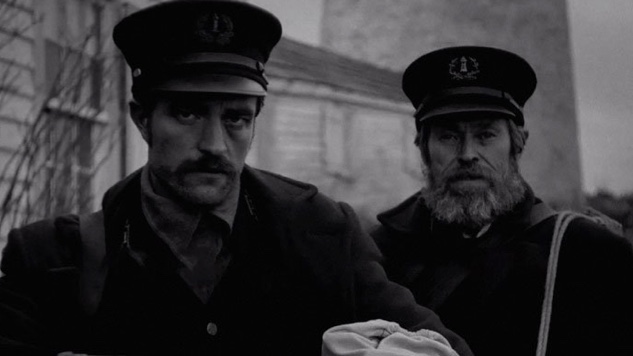The Lighthouse: Bewitched, by Dave Platt

From its opening overture, Robert Eggers’s mesmerizing sophomore feature The Lighthouse is permeated with an inexorable sense of creeping, otherworldly dread. The scenario is simple: Thomas Wake (Dafoe), a seasoned and ever-so-salty veteran of the sea and Ephraim Winslow (Pattinson), his inexperienced, taciturn assistant arrive at a remote New England lighthouse, which they are to tend for the next 4 weeks. For Winslow, this means backbreaking hard labour during the days, cleaning the cistern, lugging coal, and putting up with the mocking cries of seagulls and Wake’s neverending criticism and barking orders. Adding to the developing paranoia, Wake watches Winslow as he works, like a prison guard, from the top of the tower whose light he tends to obsessively and reserves just for himself. “See to your duties,” he responds to an early request from Winslow to divide the workload more evenly, “the light is mine.” This is the first indication that Wake is bewitched, sensuously and almost romantically, by this light and its presence, withheld from Winslow, looms over the film and the increasingly fraught relationship between the men. Narratively, the film combines the mundane and repetitive bleeding of one day into the next with bursts of distressing, dreamlike unreality, with the result that, amid the palpable unease, it is hard to be sure just how real any of this is. The immersive soundscape, a constant rhythm of waves, seagulls, an oppressive foghorn, and the creaking structure and machinery of the building itself, is a plodding march toward slowly and deliberately approaching madness.
This atmosphere is in no small part due to Eggers’s prodigious talents as a visual storyteller. Apart from its rich, inspired production design (the field in which Eggers began his film career), film is stunningly shot in black and white, in a 4:3 aspect ratio that gives the impression not so much of silent film, but of an old-fashioned silver gelatin photograph or the early plate photography of the time. This choice holds us at a distance, one that makes it necessary for the viewer to lean in closer, to submit to the same eerie, arcane pull exerted by the lighthouse and its light in an effort to make sense of it. The cinematography also emphasises the shapes and geometries of the lighthouse itself, giving its rickety and oppressive structure a weight that dominates the film and its two characters.
The Lighthouse is also surprisingly funny, with a sense of humor half sailor’s crudeness and half the glibness of classical tragedy. Much of this humor punctuates the otherwise strained exchanges between Pattinson and Dafoe, who are both outstanding. Dafoe invests a character whose gruff, salty demeanor borders sometimes on parody with a wry, cackling weariness. An old sea dog, Wake delights in subjecting Winslow to a litany of tall tales of the sea and her traditions, Winslow’s indifference to which grates him, and to a constant barrage of caustic admonishment. Dafoe is at his gruffest and most deeply-lined here, clearly enjoying himself, and it’s a joy. Pattinson’s performance and character are more unpredictable, initially our anchor into the world but someone about whom we become less and certain. It is more Pattinson’s movie than Dafoe’s, and the suspicion and jealousy that infects the dynamic between the two men are experienced from his (quite possibly unreliable) perspective. Aside from his mysterious devotion to the light, Wake is direct, straightforward almost to a fault, while Pattinson renders Winslow as weary, inscrutable and, alongside a clear desire to simply do the work and get out of there, increasingly fragile. This is a movie in which we become less, not more, certain of what we are watching. And the richness of these performances is a perfect complement to the stark, hypnotic visuals. It is partly because we sense it might be easier to figure out the people than the plot, that our suspicion and uncertainty over them reaches fever pitch. The actors play this progression, the tension between giving and withholding information and emotion, masterfully.
It’s in the specifics and surprises of its plot, the myth and allegory of Winslow’s increasingly bizarre visions and waking dreams, that the film bears the closest relationship to Eggers’s debut The Witch. But its visual language is far richer, its direction more assured, its themes and ideas more coherently and thrillingly realized. What becomes clear early on is that rather than searching for stable truth or rational explanation, The Lighthouse is a film in which the only option is to give oneself over fully to its haunting, mesmeric dream-logic.


























